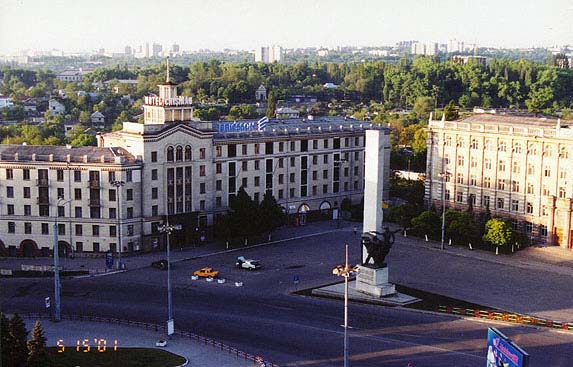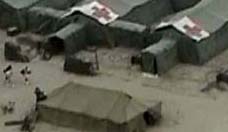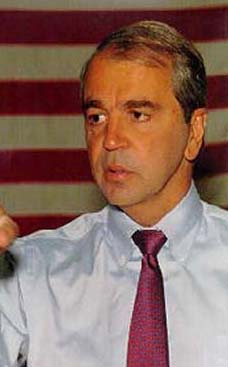
I have quite a bit of training, and personal experience, with cultural understanding, cultural sensitivity, and inter-cultural experiences. Yet living it like this, fully immersed, is a much more intensive experience than one can imagine.
Peace Corps Volunteer Ann in Modlova: Cultural Adjustment
Rabbit Ears and Bunny Tails
Filed under:
* General
ó Ann @ 3:44 am
During our Pre-Service Training, we received stacks and stacks of materials and manuals Ė language manuals and dictionaries, technical materials and references, cross-cultural guides, policy manuals, safety and health handbooks. Out of this stack that must be at least 3 feet high, Iíve found myself returning to a simple little booklet over and over, called ďA Few Minor Adjustments: A Handbook for Volunteers.Ē Itís perhaps the size of a theatre program, 64 pages long with seven short chapters addressing different stages of PCV life and experience. Itís easy to overlook this booklet, being so small, not very flashy; you might even call it unimpressive, at first glance, especially compared to all the other specialized, dense materials we received. But this little guy has turned out to be the single best piece of Peace Corps material Iíve read since I first began the application process.
The book refers to itself in the introduction as ďa kind of ownerís manual for Peace Corps service.Ē Itís generic enough to be given to any PCV, anywhere in the world. Sure, we all face different issues, have different struggles, and different successes too. But overall we all deal with the same daily necessity of cultural adjustment, and this little book addresses it simply, realistically, with a sense of humor and a lot of wisdom.
Iíve returned to this book numerous times over the last six months because it is put together so well, it addresses my different anxieties, different frustrations, different issues at different times. Towards the end of PST, on a particularly miserable day, I pulled it out and was laughing within an hour Ė laughing at myself for behaving and feeling exactly the way nearly every other PCV does towards the end of PST. Itís comforting to realize itís not just you, and itís OK to feel the way you do sometimes.
I have quite a bit of training, and personal experience, with cultural understanding, cultural sensitivity, and inter-cultural experiences. Yet living it like this, fully immersed, is a much more intensive experience than one can imagine. With my most recent reading of the Adjustment handbook, I was drawn to this passage, written by a PCV in Guinea Bissau:
ďMost of us agree that although we knew Peace Corps was going to be hard, it is often hard in a different way than we expected. We all worried about adjusting to the bugs and the heat, but thatís the easy part. Itís more of a challenge to get used to dealing with a perplexing bureaucracy, the lack of motivation in some host country counterparts, the lack of technology and education, and cultural barriers.Ē
It is true for me, too, that the things I expected to be hard were often the easiest to adjust to. I was terrified of the outhouse, but it ainít so bad after all. I was nervous about living with a host family, after many years of living alone, but thatís turned out to be the single best part of my life here. I was hung up on being a 30-something in a group of 20-somethings, worried that my place in the PCV group would be like my job at the University Ė taking care of college-age kids. Iím glad to say theyíve accepted me as a peer, and Iím pleased that Iíve been able to accept them as peers, as well. And itís OK with me now that I may sometimes fulfill the role of an advisor in their lives; Iím good at it and I like to help people, and it makes me feel good that they trust me and are comfortable talking about their issues with me.
Many of my entries here have been dedicated to the Unexpecteds, the little daily things that have consumed my time and energy. There are other unexpecteds, too. I didnít expect I would actually get used to NOT knowing whatís going on in the world. I sure didnít expect Iíd ever get used to checking email only once a week. I didnít expect it would be so hard to see Alyona leave. I didnít expect it would so hard to say good-bye to other PCVs when we leave an IST and go back to our sites, not knowing when weíll see each other again. And I didnít expect I would feel so conspicuous, so different, so un-relaxed, all the time.
It is wearing to live in the ďfishbowlĒ world of a PCV. I think it is especially disconcerting for a white American, who has always lived with the privilege of being white, part of the majority, part of the ďnormĒ (whatever that means) of American society. Itís strange to feel like I stick out here, in a much more homogeneous society than the United States is, in a village without a single person of color, in a nation that is 99% white. Yet I am different here, I stick out like a sore thumb. Iím the bumbling fool who doesnít know how to buy her bus ticket, who didnít understand what the shop clerk said to her, who just asked ďWith whom is that soup made?Ē instead of ďWith what?Ē, who somehow just by the way she walks down the street exudes ďI am different.Ē Some days you just donít want to be stared at, to be asked a million questions, to be ďon display.Ē
My other favorite bookmarked page in the Adjustment handbook reads:
ďSomeone once said that if an applicant wanted to know what it is like to be in the Peace Corps, he/she should put on rabbit ears and a bunny tail, stand at a busy intersection in downtown Chicago, walk up to people and say ĎIím here to help you.íĒ
Only you should say it in Pig Latin.
It was good to be reminded that the people I live and work with, meet every day on the street and in the shops, are not the weird ones Ė Iím the weird one here! Cultural adjustment is, in large part, about making appropriate predictions, having appropriate expectations. In your native culture, you generally know what to expect from people in various situations, without even thinking about it. When the elevator doors close and the man next to you sits down on the floor, you instinctually know that this is unusual, this is not normal. The problem is, though, that in the lack of understanding of a new culture, you continue to apply your own expectations in these new situations. Why donít Moldovans pitch a fit when the electricity is shut off for the 7th time in two weeks? Because they just donít, thatís why. And they are thinking, what the heck is she getting so worked up for because the post office opens and inspects every package she gets? And why is she getting so many packages anyway? Because I just do, thatís why. Both responses are intimately entwined in our cultural training, and itís really hard to understand and explain it to each other.
Another common thing we PCVs do to ourselves is that we think life ought to be hard, maybe it even ought to be harder than it is. Itís a guilty pleasure for me that my host family installed a water toilet and a shower. I love it, I savor it, and Iíve only told a couple other PCVs. Many of us have some little ďperkĒ that we think belittles our ďroughing it experienceĒ Ė the one with satellite TV at home, the one with a cable internet connection at work, the one with hot running water, the one with a bus to Chisinau every hour. Sometimes I think we make it harder for ourselves, too, in that quest to be the toughest. For awhile, there was a little competition about who could use the least water for their bucket bath. I dropped out of that one pretty quick. Many PCVs think the Minimalist Experience is requisite to having the Peace Corps Experience.
I started to realize that Iíve been making it harder for myself by not admitting that I need a break. I feel guilty by the notion of taking a vacation. I feel like Iím hardly working, why the hell would I need a vacation? Then you add the layer of feeling like the privileged wealthy American in the midst of the working poor. I have to admit to myself that Iím embarrassed to tell my host family, my host country friends and colleagues, that I will go on a trip they couldnít even begin to afford, and here I am doing it when I donít even have an income! Peace Corps provides us with ample stipends, you might even say generous, compared to the average income of Moldovans. (No, PC wonít be paying for my vacation, I was lucky enough to be able to put a little money aside before I left to support my personal travel expenses.) But when I try to look at myself through the eyes of my Moldovan neighbors, what do I see? A person who: always has enough money; pays her host family (per PC formula) more in room & board than they receive in salary; has spent a lot on phone calls; gets packages in the mail that the postage alone is sometimes more than a Moldovanís salary (not to mention the cost of the contents); and has already traveled to more places than any Moldovan can imagine. I feel like I walk around with dollar signs tattooed on my forehead, even though I hardly spend a dime in the village outside of what I pay my host family. My life, compared to the average Moldovans, is not hard. So why do I need a break?
Re-reading ďA Few Minor AdjustmentsĒ helped me remember that it is OK that I sometimes feel like my life is hard. Sometimes I do need a break, sometimes I want to be someplace familiar, or just someplace different from here. I can love it here, but still need a break, and thatís OK. Itís not just a guilty pleasure to take a vacation, itís a necessity. I knew this back in the U.S., knew that it was healthy and important to take time off from work and do something different so you can come back energized and refreshed. In Peace Corps, when living here is and of itself your job, itís hard to realize and accept that you need a break from the rabbit ears and bunny tail. Itís hard to admit to myself that, yes, even though Iíve wanted to do this for many years, I need a break from it after just 6 months. I didnít expect that.











